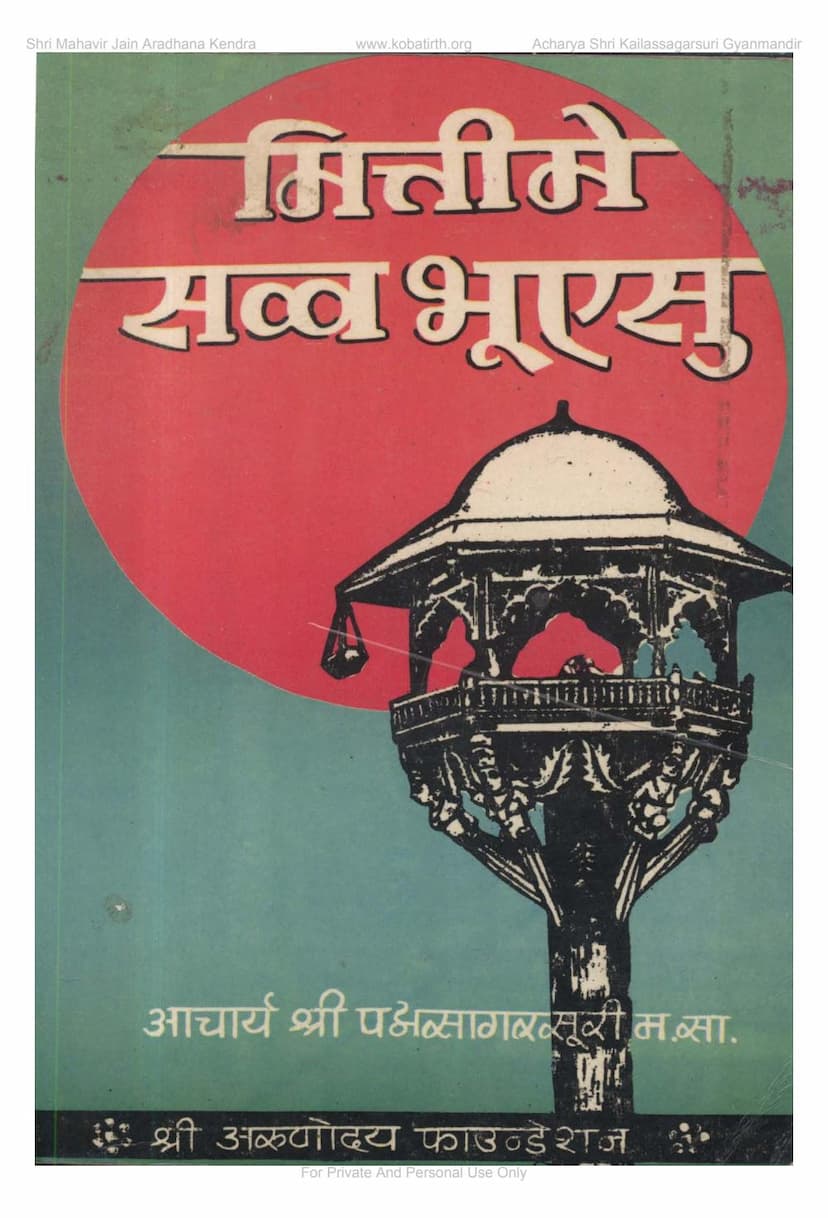Mitti Me Savva Bhue Su
Added to library: September 2, 2025

Summary
"Mitti Mein Savva Bhue Su" (Friendship with All Beings) is a collection of fifteen discourses by Acharya Shri Padmasagar Suri, published by Arunoday Foundation. The book is dedicated to fostering universal friendship. The discourses, edited by Shanti Prakash Satya Das, cover various philosophical and ethical themes within Jainism, all leading towards the central message of maitri (friendship).
The book is structured into fifteen chapters, each exploring a virtue or concept essential for cultivating universal friendship. These include:
-
Anityata (Impermanence): Emphasizes the transient nature of life, possessions, and worldly relationships. It urges listeners to focus on the present moment and avoid dwelling on the past or worrying about the future. The impermanence of life is illustrated through various examples from nature and human experience, highlighting the inevitability of death and the importance of living a meaningful life.
-
Aparigraha (Non-possession): Discusses the dangers of excessive accumulation and the importance of detachment from material possessions. It advocates for giving and sacrifice, drawing parallels with figures who renounced their wealth for higher spiritual pursuits. The concept is explained through the example of a measuring tape, which serves others by being cut up but remains unclothed itself.
-
Atma (The Self): Explores the nature of the soul, its inherent purity, and the coverings of karma that obscure it. It emphasizes self-knowledge as the path to liberation, drawing upon the Jain concept that "Atma is Parmatma" (the soul is the supreme being) when free from karmic bonds. The text uses analogies like a lens focusing sunlight to explain how concentration through meditation can purify the soul.
-
Anushasan (Discipline): Highlights the importance of self-discipline and adherence to righteous conduct. It distinguishes between imposed discipline and self-imposed discipline, advocating for the latter. Various examples illustrate how discipline, even when initially enforced through fear or reward, ultimately leads to self-control and inner strength. The text also discusses the discipline of speech and eating, stressing moderation and mindfulness.
-
Udyam (Effort): Stresses the significance of diligent effort and perseverance in achieving goals, both worldly and spiritual. It refutes the idea of blind faith in destiny, arguing that effort is the true architect of fortune. The chapter uses examples of labor transforming raw materials into valuable products to illustrate the power of human endeavor. It also criticizes laziness as the greatest enemy of progress.
-
Karmaphal (Consequences of Actions): Explains the Jain doctrine of karma, where every action has a consequence. It emphasizes that individuals are the sole architects of their own destiny, experiencing the fruits of their good and bad deeds. The text uses analogies like a prisoner of karma and a body as a prison cell to illustrate this principle. It also highlights that only our karma accompanies us in the afterlife.
-
Kripanta (Stinginess): Condemns greed and stinginess, portraying them as detrimental to both the individual and society. It criticizes those who hoard wealth without enjoying or utilizing it, comparing them to useless tools. The chapter argues that true wealth lies in generosity and sharing, and that stinginess leads to eventual ruin. Examples of stingy individuals and their unfortunate fates are presented.
-
Grahakata (Appreciation of Qualities): Encourages the cultivation of the quality of recognizing and appreciating good qualities in others. It uses analogies like a sieve that separates good from bad, and a gardener who picks flowers while leaving thorns, to illustrate the importance of discerning good. The text criticizes the human tendency to focus on others' faults while ignoring their own, urging readers to embrace positive qualities for personal and societal growth.
-
Gaurav (Dignity/Self-Respect): Discusses the importance of maintaining dignity and self-respect, distinguishing it from arrogance. It emphasizes that true dignity comes from virtuous actions and contributions, not from wealth or status. The chapter stresses the importance of upholding one's principles and heritage, citing examples of individuals who maintained their self-respect even in adverse circumstances.
-
Chaturai (Cleverness/Wisdom): Explores the practical application of intelligence and wisdom in navigating life's challenges. It differentiates between mere intelligence and the skillful application of that intelligence, highlighting how wisdom can be used for both constructive and destructive purposes. Examples showcase cleverness being used for good, such as the story of Shankaracharya outwitting a Vedic scholar, and for selfish motives, like the fraudulent actions of a Muslim cleric.
-
Chinta (Worry/Anxiety): Identifies worry as a destructive force that erodes physical and mental well-being. It contrasts productive thinking with unproductive worry, advocating for a proactive approach to problem-solving rather than succumbing to anxiety. The chapter emphasizes that worry is like a slow poison that destroys one's health, vitality, and intellect.
-
Daya (Compassion): Extols compassion as the foundation of all religions and virtues. It emphasizes the Jain principle of ahimsa (non-violence) and advocates for empathy towards all living beings. The text argues that true compassion stems from recognizing the shared experience of suffering and the interconnectedness of all life. Examples from various religious traditions highlight the universal importance of kindness.
-
Manavta (Humanity): Defines humanity as the ethical and moral conduct that distinguishes humans from animals. It emphasizes the importance of virtues like empathy, kindness, righteousness, and service to others. The chapter suggests that true humanity lies in living a life of purpose, contributing positively to society, and embodying moral principles.
-
Mitrata (Friendship): Explores the essence and value of true friendship. It describes the qualities of a good friend, such as loyalty, honesty, support, and constructive criticism. The chapter distinguishes between true friends who offer valuable advice and fake friends who flatter and mislead. It highlights the importance of choosing friends wisely and the profound impact that friendship can have on one's life.
The book is filled with numerous anecdotes, parables, and quotes from scriptures and philosophers to illustrate its teachings, making complex Jain philosophical concepts accessible and relatable to the reader. Acharya Padmasagar Suri's discourses aim to guide individuals towards a life of maitri (universal friendship), leading to spiritual upliftment and inner peace.